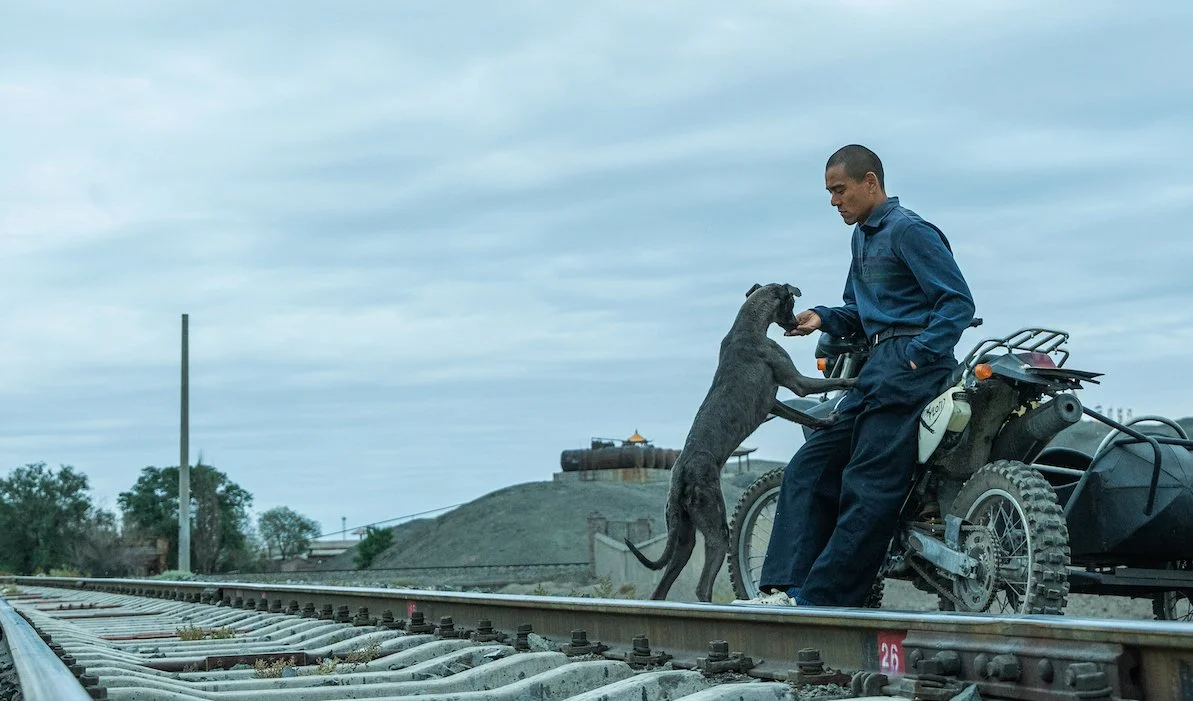A Boy and his Dog
Guan Hu steps out of blockbuster territory for an ol’ fashioned redemption story with a good boy.
Black Dog
Director: Guan Hu • Writers: Guan Hu, Ge Rui, Wu Bing
Starring: Eddie Peng, Jia Zhangke, Tong Liya, Zhang Yi, Xin
China • 1hr 56mins
Opens Hong Kong Sep 5 • IIA
Grade: B
If there’s one thing Guan Hu’s Black Dog | 狗陣 has going for it it’s that at least it’s not another in a long line of middling-to-garbage “thrillers” set in unidentified SEA hellholes of indeterminate cultural identity that are China/Not China. Yes I’ve been banging on about this for a while, and I’ll continue to bang on until it stops. But that’s neither here nor there. Black Dog is, however, the latest in a moderate line of neo-noir Asian westerns – Diao Yinan’s The Wild Goose Lake, Wei Shujun’s Only the River Flows, Jia Zhangke’s A Touch of Sin, to a degree Ning Hao’s No Man’s Land – that exploits China’s evocative barrenness to use as a backdrop metaphor for personal disillusionment, regret, isolation and failed ambitions among other contemporary conundra. At this point in his career Guan is best known for big, blustery epics like My People, My Country and The Eight Hundred, so the relatively low-key and introspective Black Dog is a bit of a return to the earlier form of his 1994 debut Dirt, a scrappy film about a Beijing rock band. This is where I’m supposed to expound on the fabulousness of the Un Certain Regard and Palm Dog Award winner. Make no mistake: the dog is terrific. He and Eddie Peng Yu-yan are terrific together. But when they’re not on screen together the film flails around with a half-baked revenge plot, an estranged father-son drama and a tepid (that’s generous) romance. There’s nothing truly new in Black Dog, but Peng and the black dog make it worth a watch.
On the edges of the Gobi Desert one afternoon, a bus en route to dying Chixia flips over and crashes when a pack of stray dogs gets in the way. On this bus and promptly singled out by the cops is Erlang (Peng) a Chixia native and budding drifter-loner, fresh out of prison. Also? A bit of a local celeb for being 1) a stunt cyclist back in the day and 2) a convicted killer. It’s just weeks until the 2008 Summer Olympic Games in Beijing and as part of a clean-up programme to put on the best possible face, pillar of the community Uncle Yao (director Jia) is leading a city-wide effort to round-up the strays. Strange, because the town in being razed to the ground in the name of progress, so there’s no one there to see how free of strays it is, much less tourists. Erlang is signed up to collect the dogs by his PO, then turns an eye on the bounty for one dog in particular: a possibly rabid black Greyhound mix (Xin, no shit, the film’s standout). Turns out the dog is not rabid, and Erlang connects with its desolate outsiderness and unreasonably feared position in town. Their connection helps each of them find personal redemption.
DOP Gao Weizhe clearly trained at the bleak-beautiful school of cinematography because Black Dog’s dusty, nealry monochrome landscape is the perfect space for Erlang’s emergence from beneath his own shadow and reconciliation with a new life. As the city literally collapses around him and the residents move on – for better or worse – Erlang and his unnamed pooch are compelled to reposition themselves in the world too. Black Dog is at its best, and its darkly funniest, when the two are forging their initial bond and indulging their mutual humanity, for lack of a better word. The movies never tire of the healing power of dance/music/animals.
So it sucks when they’re not on screen – or when they’re not together on screen. Black Dog goes way off track when Guan, his regular writer Ge Rui and newbie Wu Bing start weaving in story threads that are either overly familiar, underwritten or simply unengaging; the third act is all over the map with ideas and only partially thought-out symbols. When the circus comes to town (why?) Erlang kinda sorta starts up a romance with a carny called Grape (Tong Liya, The Taking of Tiger Mountain), which is rooted in absolutely nothing. He tries to make amends with his dad, who runs the world’s saddest (and most infuriating) zoo. They make nice. Erlang initially spends a great deal of time dodging Butcher Hu (Hu Xiaoguang), whose nephew was the victim that sent Erlang to prison – but then they make nice too. It’s all very prosaic and rather pointless, and nowhere near as profound as Cannes juries would have you believe. But leave Peng – who does some of his best work ever as the silent, frustrated Erlang – and Xin to themselves and things pick up considerably. They are, indeed, very good boys. — DEK



